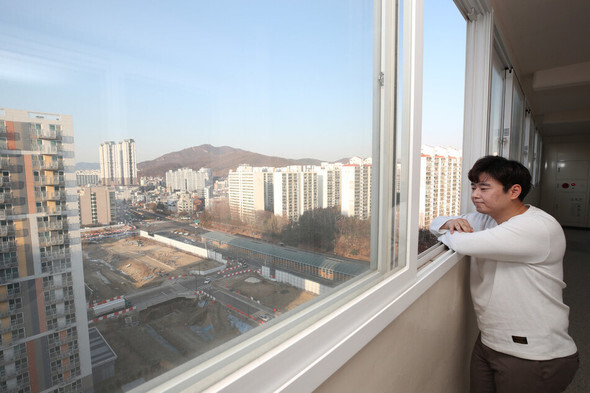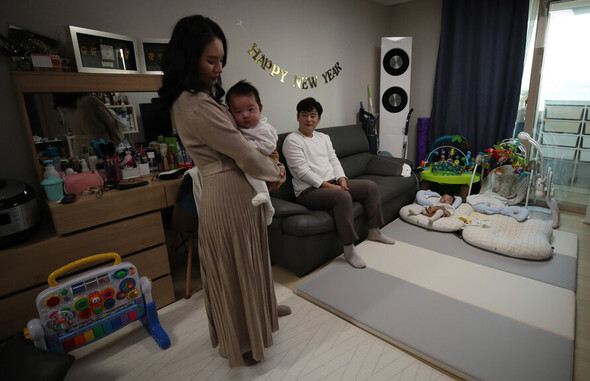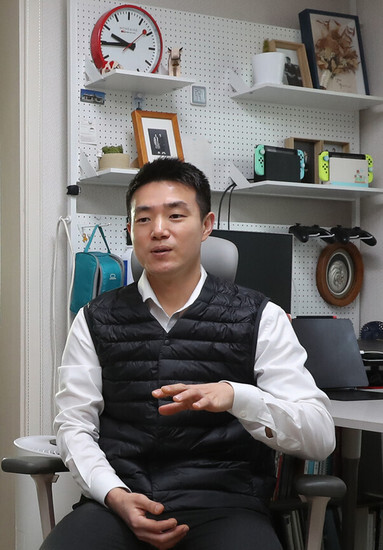hankyoreh
Links to other country sites 다른 나라 사이트 링크
S. Koreans priced out of homeownership decry unfairness of real estate market

The people most affected by the surge in housing prices during the administration of South Korean President Moon Jae-in have been those who don’t own a home. According to homeownership statistics for 2020, non-homeowning households account for 43.9% (9.19 million) of Korea’s 20.92 million total households.
But in the run-up to Korea’s presidential election in March, the main campaign pledges are to ease taxes on homeowners by lowering the transfer tax and property tax. About the only pledge that would benefit non-homeowners is to supply 2.5 million housing units over the next five years.
When the Hankyoreh carried out in-depth interviews with 23 non-homeowning voters, those voters generally wanted the government to expand public housing programs, but they weren’t very hopeful that the real estate issue would be solved by the presidential election. Here we present the stories of two non-homeowners who described themselves as being lower-middle class.

Newlyweds in “hope town” housing project losing hope
“The moment we learned we’d won a preliminary spot in the housing lottery, I turned to my wife and said we’ll have to skip our anniversary and birthdays for the next few years. I just don’t know if we’ve actually managed to become homeowners or not.”
Kang Gi-woong, 34, had his name drawn in a preliminary housing lottery in a “hope town” housing project for newlyweds in the Woram neighborhood of Uiwang, Gyeonggi Province, in November last year. Worry washed over him at what should have been a happy moment.
Kang and his wife can’t count on their parents for financial assistance, and their entire assets amount to 20 million won, or roughly US$16,600. That means they still need to come up with 390 million won of the 410 million won price of the 55 square meter (592 square foot) house they won the right to buy in the lottery. Even if they can cover 70% (287 million won) of the price with a mortgage, they’ll still be short 100 million won.
Kang’s wife quit her job as a nurse after having twins in August. Kang has a monthly salary of just over 3 million won (US$2,500). Even if the family diligently puts aside 1.5 million won every month for the 4-5 years left before the apartment is ready for occupancy, that will only add up to 72-90 million won.
Another problem is that the lottery price could go up even further.
“In a group chat on KakaoTalk for preliminary lottery winners, some say the final lottery price might end up being 450 million won if housing prices keep soaring. People who have money saved up are fine, but more than half are anxious.”
For quite a few newlyweds here, the “hope town” might end up a source of despair.
“We can’t cut expenses for the kids, so to afford the house we’ll just have to spend less on food and sundries for my wife and me,” Kang said.
He also said he can’t understand when people he knows argue that multiple homeownership is “all based on the individual’s capabilities.”
“Who created those capabilities?” he asked. “When someone is born on third base, all they need is a single to score a home run.”
“For me, it’s a problem even getting to first base,” he said.

”How can 800 million won be considered ‘public’ housing?”
Kim Su-yeong, 36, has given up his hopes of both homeownership and having children.
“It just seemed like I wouldn’t be able to have kids and raise them,” he said.
“As I saw housing prices rising steeper than salaries, it looked like I wouldn’t even be able to find a place in Seoul.”
Kim works full time as a librarian. Between him and his spouse, the family makes a monthly income of 4 million won. The apartment where they live now, a two-room measuring 26 square meters, demanded a key money deposit of 170 million won — 100 million of which they obtained through a loan.
In 2020, a key money ceiling and contract renewal request rights were instituted in the Housing Lease Protection Act. That enabled the couple to renew their lease without any additional payments — but it’s a right they can only exercise once.
The couple has begun setting aside 1 million won, close to US$850, per month.
“We’re worried about the year after next [when the contract ends],” Kim said. “The pricier places are over 100 million won more expensive now, while the average places have gone up by 40 to 50 million won.”
Social housing is supposed to be available for cheaper than market rates. But since the Moon Jae-in administration came into office, market rates have roughly doubled — a situation reflected in sale prices that are beyond the means of ordinary dual-income recently married couples in their 30s in terms of income and assets.
“They’re asking for almost 500 million won in Gyosan, a neighborhood of Hanamand 300 million won in Hoecheon,” Kim said, referring to neighborhoods in the Gyeonggi Province cities of Hanam and Yangju, respectively.
“We thought about moving to Hoecheon, even if that means a four-hour commute both ways, but the loan is too much for us to handle,” he added.
“There are public sale listings upwards of 800 million won in Gwacheon. Is that really ‘public housing’?”
If Kim could send a message to the presidential candidates, it would be that “unearned income from inherited real estate” is the “beginning of an unfair society.”
“When you’re born to wealthy parents, that’s a matter of good fortune,” Kim said. “Shouldn’t the taxation rate be high on unearned income?”
By Jin Myeong-seon, Noh Ji-won and Kim Yong-hee; staff reporters
Please direct questions or comments to [english@hani.co.kr]

Editorial・opinion
![[Column] A death blow to Korea’s prosecutor politics [Column] A death blow to Korea’s prosecutor politics](https://flexible.img.hani.co.kr/flexible/normal/500/300/imgdb/original/2024/0415/7517131654952438.jpg) [Column] A death blow to Korea’s prosecutor politics
[Column] A death blow to Korea’s prosecutor politics![[Correspondent’s column] The US and the end of Japanese pacifism [Correspondent’s column] The US and the end of Japanese pacifism](https://flexible.img.hani.co.kr/flexible/normal/500/300/imgdb/original/2024/0412/1017129080945463.jpg) [Correspondent’s column] The US and the end of Japanese pacifism
[Correspondent’s column] The US and the end of Japanese pacifism- [Guest essay] How Korea turned its trainee doctors into monsters
- [Guest essay] As someone who helped forge Seoul-Moscow ties, their status today troubles me
- [Editorial] Koreans sent a loud and clear message to Yoon
- [Column] In Korea’s midterm elections, it’s time for accountability
- [Guest essay] At only 26, I’ve seen 4 wars in my home of Gaza
- [Column] Syngman Rhee’s bloody legacy in Jeju
- [Editorial] Yoon addresses nation, but not problems that plague it
- [Column] Can Yoon and Han stomach humble pie?
Most viewed articles
- 1[News analysis] Watershed augmentation of US-Japan alliance to put Korea’s diplomacy to the test
- 2[Guest essay] How Korea turned its trainee doctors into monsters
- 3[Column] A death blow to Korea’s prosecutor politics
- 4[Photo] Cho Kuk and company march on prosecutors’ office for probe into first lady
- 5[Column] A third war mustn’t be allowed
- 6‘National emergency’: Why Korean voters handed 192 seats to opposition parties
- 7Exchange rate, oil prices, inflation: Can Korea overcome an economic triple whammy?
- 8After Iran’s attack, can the US stop Israel from starting a regional war?
- 9[Editorial] New KBS chief is racing to deliver Yoon a pro-administration network
- 10[Column] Down with the so-called social ladder